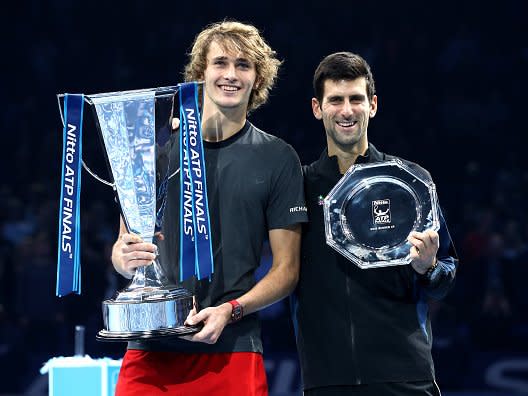Alexander Zverev’s win against Novak Djokovic proves next generation are finally ready to topple the old guard

Alexander Zverev’s elation after the biggest win of his career at the Nitto ATP Finals in London on Sunday night was evident, but there was no chance of the 21-year-old going over the top as he looked to the future following his victory over Novak Djokovic.
“Just chill out a little bit,” Zverev pleaded when asked about the assertion by Djokovic, five times a winner of the year-end title, that the German was capable of surpassing his own records. “Oh, my God,” Zverev said with a laugh. “I’ve won one of those. He won five. He’s won, I don’t know, 148 titles more than me. Let’s not go there for now.”
Zverev’s victory, nevertheless, inevitably sparks debate about whether the long-anticipated toppling of the old guard at the top of the men’s game is actually underway. The two biggest tournaments in the final month of the season have been won by younger players – 22-year-old Karen Khachanov at the Paris Masters and Zverev in London – while some of their contemporaries have also made big strides this year.
Stefanos Tsitsipas, aged 20, who beat Djokovic in August en route to his first Masters Series final in Toronto, has climbed 76 places in the world rankings since January to his present position at No 15. Alex de Minaur, aged 19, who lost to Tsitsipas in this month’s “Next Gen” final in Milan, has been voted newcomer of the year by his fellow professionals after starting the season at No 208 in the rankings and finishing it at No 31.

“Us young guys, we’re coming through,” Zverev said. “We’ve got multiple years ahead for all of us. A lot of things can happen. A lot of things can change. I'll do everything I can to be on top.”
Meanwhile some of those approaching the tennis equivalent of middle age are also making their mark. Dominic Thiem, aged 25, played in his first Grand Slam final at this year’s French Open, while 23-year-old Kyle Edmund reached the semi-finals of the Australian Open and won his first title in Antwerp last month.
The younger generations, nevertheless, have yet to loosen the grip of the old guard on the sport’s biggest prizes. Of the last 55 Grand Slam titles, dating back to January 2005, only two have not been won by members of the “Big Five” of Roger Federer, Rafael Nadal, Djokovic, Andy Murray and Stan Wawrinka. They are all now in their thirties, as are Juan Martin del Potro and Marin Cilic, the only gatecrashers on the Big Five’s exclusive Grand Slam party of the last 13-plus years.
Despite their other breakthroughs in the game, the younger men have yet to make a big impact at Grand Slam level. For example, Zverev’s best effort was a run to this year’s French Open quarter-finals, while Khachanov has not gone beyond the fourth round at a Grand Slam event.
The bookmakers, unsurprisingly, are not expecting a rapid change at the top: Djokovic, who in the last five months has won Wimbledon and the US Open and reclaimed the world No 1 ranking, is already a hot favourite to win the Australian Open in January, ahead of Nadal and Federer.
“Obviously they’re still going to be the guys to beat at the big tournaments,” Zverev said. “I will do everything I can to get better, to compete with them always. I feel like I’m doing that. But still, I have a lot of things to improve. I’m still very young. Hopefully next year I’ll be able to play better tennis than I did this year, even though it’s been a good year.”
In the immediate future much might depend on the fitness of the old guard. Djokovic, despite admitting that he had not felt at his best in recent weeks, appears to have overcome his physical issues, but Nadal has not played since a recurrence of his knee problems forced him out of the US Open, Murray is still going through rehabilitation following a hip operation in January and Wawrinka has not made a final since starting his comeback in January after knee surgery.

Federer continues to defy the years but has suffered some surprising losses of late. The 20-times Grand Slam champion says, nevertheless, that he is “excited for next season” and “very proud that at 37 I'm still so competitive”. Djokovic aims to build on “a phenomenal season that I have to be definitely very proud of” and Nadal wants to “keep playing tennis for a couple of years”. Murray, meanwhile insists that he is “feeling physically a little bit better every day” as he prepares for a busy start to 2019, having played only 12 matches this year.
In the women’s game the old guard has not been as dominant at the highest level, despite the continuing efforts of the remarkable Serena Williams. Angelique Kerber, aged 30, is the only current top 10 player not in her twenties. Since Williams won last year’s Australian Open the seven subsequent Grand Slam titles have been won by seven different players, five of them by first-time Grand Slam champions.
That group includes 20-year-old Naomi Osaka, who won this year’s last Grand Slam title at the US Open. In addition, four of the six most important events played on the women’s tour after Flushing Meadows were won by comparatively young players in Elina Svitolina (aged 24), Ashleigh Barty (22), Aryna Sabalenka (20) and Daria Kasatkina (21).
Williams, nevertheless, remains the favourite to win next year’s Australian Open. The men’s and women’s tours may have only just drawn to a close this year, but in less than two months’ time the battle of the generations will be renewed with perhaps even greater vigour than ever.

 Yahoo Sport
Yahoo Sport 





































